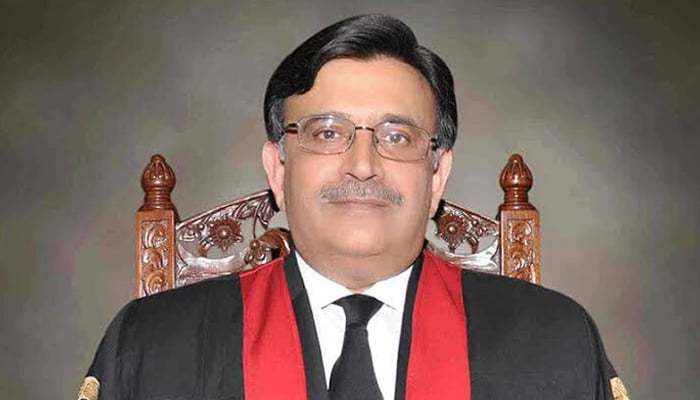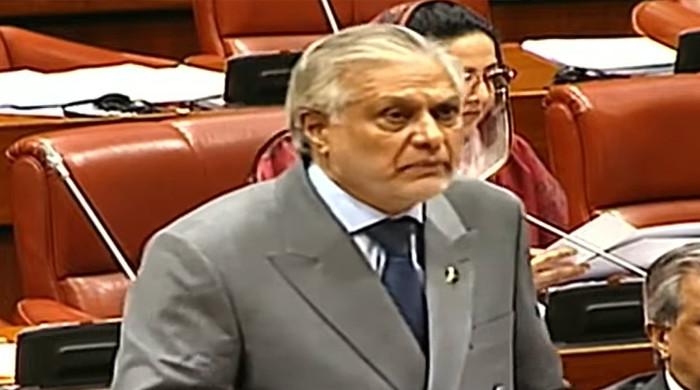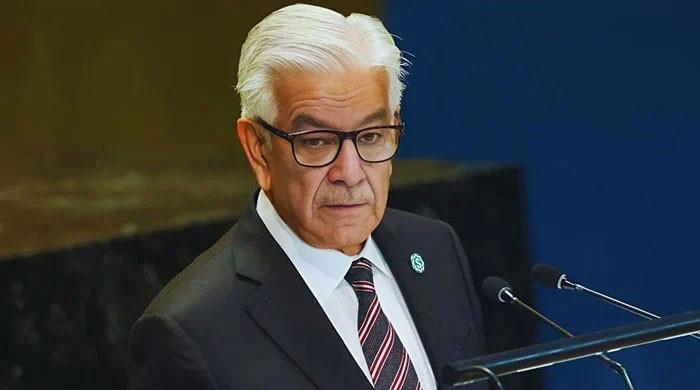Justice Umar Ata Bandial to take oath as 28th chief justice on Feb 2: sources
Justice Bandial will take over reigns from incumbent CJP Justice Gulzar Ahmed, who will retire after serving as top judge for over 2 years
January 12, 2022

- Justice Bandial will take over reigns from incumbent CJP Gulzar Ahmed.
- He will continue as CJP till his retirement on September 18, 2023.
- The change will take place on the principle of seniority.
ISLAMABAD: Supreme Court Justice Umar Ata Bandial will take oath as Pakistan's 28th chief justice on February 2, replacing incumbent CJP Justice Gulzar Ahmed, sources informed Geo News Wednesday.
The change will take place on the principle of seniority in which the puisne judge becomes the chief justice.
The Ministry of Law and Justice secretary has sent the summary to President Arif Alvi to appoint Justice Bandial as the next CJP, sources said. After the president's nod, the ministry will issue a notification.
Read more: Justice Gulzar Ahmed sworn in as 27th Chief Justice of Pakistan
Justice Bandial will continue as the chief justice till his retirement on September 18, 2023, and will hold the position for some 19 months.
Supreme Court judges, including the chief justice, retire once they are 65, while high court justices superannuate on reaching 62 years of age under the constitution.
CJP Gulzar Ahmed will retire after working in the top judicial position for more than two years. Justice Ahmed assumed office on December 21, 2019, replacing ex-CJP Justice Saqib Nisar.
A brief look at Justice Bandial's career
In his law practice at Lahore, Justice Bandial dealt mostly with commercial, banking, tax, and property matters. From 1993 until his elevation, he also handled international commercial disputes, according to the details on the Supreme Court's website.
He appeared in arbitration matters before the Supreme Court and also before international arbitral tribunals in London and Paris. Justice Bandial was elevated as an LHC Judge on December 4, 2004.
Read more: JCP approves nomination of Justice Ayesha as SC judge
He had declined oath under PCO [provisional constitutional order of Pervez Musharraf] in November 2007 but was restored as an LHC judge as a result of the lawyers’ movement for the revival of the judiciary and constitutional rule in the country.
Later, he served for two years as the LHC chief justice until his elevation as a judge of the Supreme Court in June 2014. During his career as a judge of the LHC and the Supreme Court, he has rendered judgments on a number of important public law and private law issues.
These include pronouncements on civil and commercial disputes, constitutional rights, and public interest matters.
He received his elementary and secondary education at different schools in Kohat, Rawalpindi, Peshawar, and Lahore. He secured his BA (Economics) degree from Columbia University, USA followed by a Law Tripos degree from Cambridge University, UK, and qualified as Barrister-at-Law from Lincoln’s Inn, London.
In 1983, he was enrolled as an advocate of the LHC and some years later, as an advocate of the Supreme Court.
Who will become CJP after Justice Bandial?
Following Justice Bandial’s superannuation, Justice Qazi Faez Isa will become the chief justice to serve this office for over one year till October 25, 2024, according to The News.
In between, Justice Maqbool Baqar will retire without becoming the chief justice. Similarly, Justice Mazhar Alam Khan will also superannuate without being the chief justice.
However, after the superannuation of Justice Qazi Faez Isa, Justice Ijazul Ahsan will become the chief justice and work in this position for some 10 months till August 4, 2025.
Article 175A says the president will appoint the most senior judge of the Supreme Court as the chief justice.











